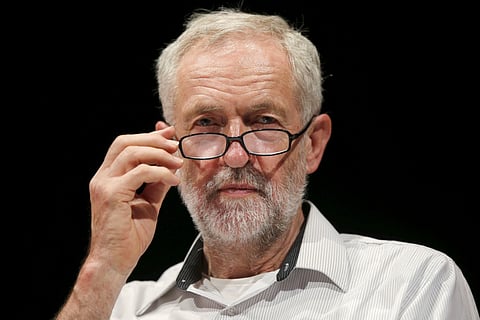Corbyn’s plan to turn Britain into Zimbabwe
While the ‘People’s QE’ has been embraced by the Labour leadership contender, it would ultimately lead to disaster

Let’s not worry too much about the company Jeremy Corbyn has kept over more than 50 years of firebrand, Left-wing protest, distasteful though some of it may have been; it is his policies that are the far greater stain on his judgement. Admittedly, the chances of him ever being in a position to implement them appear remote.
Even so, Corbyn’s alternative “vision” for the economy does seem to have struck a popular chord after more than 20 years of dreary, centrist politics. His is the Syriza-like agenda that Ed Miliband, the former Labour leader, was struggling to articulate, but was ultimately too compromised and cautious to embrace fully.
As I say, it seems deeply unlikely that Britain would ever suffer the economic calamity that brought Syriza to power in Greece, but it is none the less quite something to see such plainly bonkers ideas as “People’s QE” enter the political mainstream in a country as supposedly stable as Britain.
Of all Corbyn’s crackpot policies, “People’s QE” is by far the most dangerous, for if implemented unchecked, it would almost inevitably lead to a collapse in the currency and eventually the kind of hyperinflation that engulfed Weimar Germany. More recent examples include such notable paragons of economic success as Zimbabwe and Argentina.
Recent episodes of hyperinflation
According to the US economist Steve Hanke, there have been at least 56 episodes of hyperinflation in the modern age, taking in countries as varied as France, Russia and Peru. Virtually all of them have one thing in common — extensive use of the central bank printing press to fund fiscal deficits.
To my knowledge, there is only one such use of monetary voodoo that has had anything other than disastrous consequences — Japan in the Thirties, and even there you would be hard-pressed to argue that the aggressive militarisation it enabled counted as a desirable outcome.
Corbyn reckons there is plenty we can learn from Venezuela’s Hugo Chavez. Indeed we can, for Venezuela looks as if it will soon qualify for Professor Hanke’s list too. This hasn’t stopped 35 economists putting their name to a letter of support for “People’s QE”, which as conceived by Corbyn and his backers would require the Bank of England to print money to fund publicly directed infrastructure spending.
Left-wing persuasion
I have to confess to knowing of only two of these economists. This possibly says more about me than the signatories, all of whom are no doubt experts in their fields. A brief half an hour on Google reveals virtually all of them to be of notably Left-wing persuasion. What is certain is that they cannot know much economic history to think “People’s QE” a sensible way of proceeding.
This is not to argue that in intellectual terms, the idea is entirely unsound, or that there are no circumstances in which, in desperation, you might want to use such a mechanism. Certainly, the idea has a very long pedigree, dating back as far as Henry VIII, whose repeated debasement of the coinage earned him the nickname “Old Copper Nose”. Profligate monarchs are one thing.
In more recent times, monetary manipulation of the type suggested by Corbynomics has spawned some quite surprising advocates, including Milton Friedman, the unashamedly free market economist who first coined the expression “helicopter money”. In circumstances of exceptionally depressed demand, he suggested, the central bank might want to print money, and scatter it by helicopter across the land in the hope of persuading people to spend more. Yet these circumstances do not exist in Britain today.
World of difference
There is also a world of difference between the type of “quantitative easing” practised by the Bank of England and the direct monetary financing of government spending advocated by Corbynomics. The former is merely a way of depressing the risk-free interest rate — or of trading one financial asset, government bonds, for another, cash.
The latter directly harnesses monetary policy to fiscal purpose and therefore throws all notion of discipline in the public finances to the winds. The moment international markets suspect monetary financing, they trash the currency, thereby fuelling inflation and raising interest rates.
Progressively starved of the ability to borrow at reasonable rates, the government will then turn ever more aggressively to the printing press to fund its spending, and pretty soon it will require the proverbial wheelbarrow of money just to buy a loaf of bread. Nobody is going to argue too much with the need for more infrastructure spending.
Yet too often such spending is used for vote-buying purposes, as indeed happened in the run up to the 2010 election, when under the guise of fiscal stimulus to counter the financial crisis, Labour sanctioned a whole host of worthless, pork-barrel projects in key marginal constituencies.
Anyone for a free lunch? Who wouldn’t welcome such a prospect? Regrettably there is no such thing; inevitably, it carries a price, and in economics, it is nearly always a calamitous one.
— The Telegraph Group Limited, London 2015


